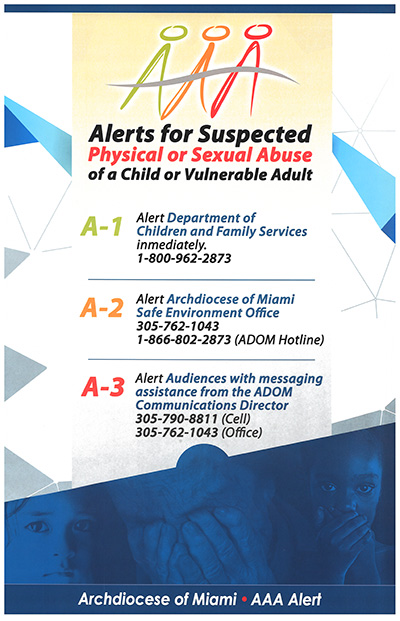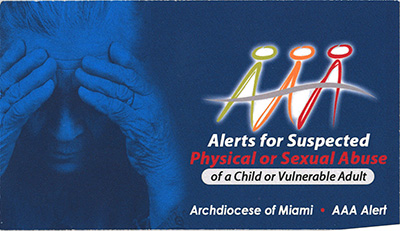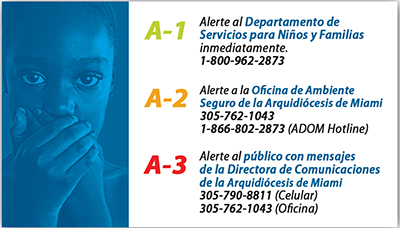By Florida Catholic staff - Florida Catholic

Photographer: FILE
The goal of the AAA alert poster is to remind pastors and other church personnel of the steps to take if they witness or are told of suspected abuse of children or vulnerable adults.
MIAMI | Just like calling AAA can be a lifeline for drivers stuck on the side of the road, the Archdiocese of Miami is hoping a different AAA can rescue � and possibly prevent � children and vulnerable adults from abuse.
The archdiocesan AAA � which stands for Alert, Alert, Alert � lists, in order, the places that must be notified whenever suspicion arises that a child or vulnerable adult is being physically or sexually abused:
- A-1: the Department of Children and Families abuse hotline, 1-800-962-2873
- A-2: the archdiocese’s Safe Environment hotline, 1-866-802-2873
- A-3: all audiences.
To make it even easier to remember, the information will be distributed to archdiocesan clergy, employees and volunteers in the form of hundreds of posters and 10,000 business cards.
The business cards were suggested by Corpus Christi’s pastor, Father Jose Luis Menendez, as a way to help people quickly access the information.
“It was a great idea and we’re following his suggestion,” said Mary Ross Agosta, who combined her dual jobs as archdiocesan director of Communications and director of the Safe Environment office to come up with the AAA format.
“The Archdiocese of Miami has pledged to maintain a safe environment for children and vulnerable adults. We are all called upon to be that ‘extra set of eyes’ and know what to do when abuse or mistreatment is suspected,” said Ross Agosta. “The business cards provide the three easy steps with what to do; and the Safe Environment staff is always available to guide and advise.”
Notifying the authorities is a legal obligation in Florida. According to the statute, “any person who knows, or has reasonable cause to suspect, that a child is abused, abandoned, or neglected � is a mandatory reporter.”
“Professionally mandated reporters” are those who are legally obligated to identify themselves when making a report. They include medical and mental health professionals, social workers and teachers, day care center staff and any “practitioner who relies solely on spiritual means for healing.”

Photographer: FILE
Front of business card-size AAA alert to remind pastors and other church personnel of the steps to take if they witness or are told of suspected abuse of children or vulnerable adults.

After civil authorities are alerted, the archdiocese must be made aware of the problem. The Safe Environment Policy states that “all allegations of sexual abuse by Church personnel or on church premises shall be reported promptly to the Archdiocesan Contact Person,” who in turn will notify the archdiocesan attorney, so that he can notify the local State Attorney.
That “contact person” is the one who answers the archdiocesan abuse hotline: Ross Agosta or the Victim Assistance Coordinator, Deacon Richard Turcotte.
Finally, the information must be shared with the appropriate audiences, Ross Agosta said. The Safe Environment Policy mentions “the pastor, school principal, director of religious education, or other responsible supervisor.”
The AAA states that those undertaking this third step will receive “messaging assistance from the ADOM Communications Director.” The numbers that follow are for Ross Agosta’s office and cell phones.
The business cards and posters should be in the hands of all archdiocesan priests, parishes, schools, Catholic Charities and Catholic Health Services facilities by the end of May. That’s a total of almost 6,000 employees and volunteers, Ross Agosta said.
“The Safe Environment Office continues to provide clear and concise information regarding the protection and safety of our children and vulnerable adults,” she added. “This project is one that we’re very proud of and the concept of the business cards is to enable everyone who is an employee and a volunteer for the archdiocese to have this important information at their fingertips.”

